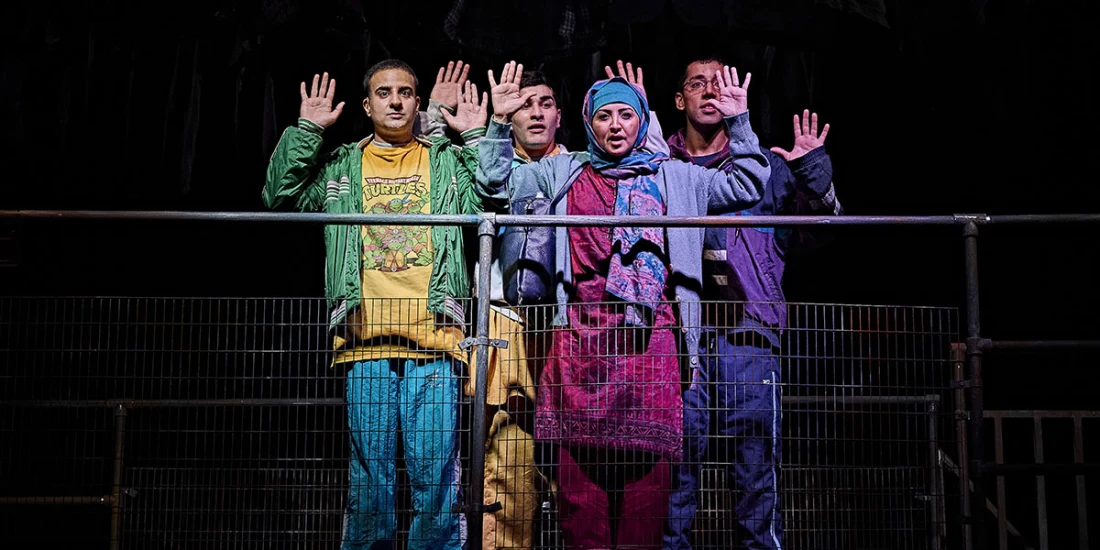'The Boy With Two Hearts' review — a heartwrenching yet sanitised tale
You’d have to be bereft of a heart not to be moved by The Boy with Two Hearts, which has arrived at the National Theatre after its stage premiere last year in Wales, where the climactic sequence of this extraordinary saga takes place.
Based on the real-life story by Hamed and Hessam Amiri that became a BBC Radio 4 Book of the Week, Phil Porter’s stage adaptation recounts the gruelling passage of the two then-young boys and their family from Afghanistan to the UK and towards a new life that was joyous in some ways, grievous in others.
We first encounter the Amiris in Afghanistan’s third-largest city, Herat, where the family matriarch, Fariba (Houda Echouafni), is an outspoken firebrand at a time and place (2000 under the Taliban) where such calls for female emancipation are dangerous indeed; depressingly, that would seem once again to be the case, which only amplifies the poignancy of the picaresque journey that soon unfolds. The timeliness of it all is tragic to behold.
Imperilled by Fariba’s remarks, the family is soon on their difficult way westward, their quest made doubly urgent by heart issues besetting elder child, Hussein (Ahmad Sakhi), who needs medical treatment that he will only find once he reaches Cardiff and is placed within the care of the NHS.
Just 14 at the start, Hussein has two younger brothers – 10 year-old Hamed (Farshid Rokey) and Hessam (Shamail Ali), nearly 7. The three boys squabble when not trading notes on football and movies and are doted upon by their loving mum and a savvy dad, Mohammed (Dana Haqjoo), who is alive and alert to the copious and costly negotiations that are needed.
Their route stretches from Russia across to Ukraine and then Europe, landing “Amiri United” (as the family bills itself) at the refugee camp in Sangatte. Once in France, they encounter one fellow traveller who has attempted the Channel crossing into Britain more than a dozen times.
Amit Sharma’s empathic staging — the playtext displayed throughout above the stage — is especially vivid in chronicling the difficult circumstances under which this quintet moves from place to place, sucking in their breath and lying “in a box within a box”, always careful to go unnoticed.
Bribery and violence are a factor throughout, and the protean cast shift with ease from family members to play the various officials, human traffickers, and medics encountered along the way. (One giggly young girl is drolly represented onstage by a pair shoes.)
The tone throughout is of a family-friendly narrative possessed of a childlike simplicity that adults might find a shade simplistic. Of no doubt to any spectator is that this is “not a sad story but a story of thanks”, or so we’re told, and the NHS comes out of it a star – a beacon of hope following the unimaginably harsh road towards its portals.
I confess to tiring somewhat of the cutesier passages where things are told rather than shown and where we are informed rather unnecessarily that the tale on view “is about all of us”, lest playgoers think they can distance themselves from the determination on view.
A lot of the dialogue tends towards the “every second counts” school of dramaturgy, and you can’t help but feel as if you’re watching a sanitised gloss on events that a film or TV mini-series might expand upon more fully. (The Jungle dealt with many of the same themes and situations in an entirely sophisticated and upfront manner.)
Where the show works best is in the delightful interplay amongst a clearly committed company who feed off one another’s energy. That’s true even in those rather awkward sections after the interval where the house lights are raised and the audience is addressed directly as we follow Hussein through a 14-hour heart operation; the brotherly banter turns toward the comparative virtues of Arsenal and Manchester United on the road to a mother-son embrace that comes honestly by its tears.
Hayley Grindle’s set shows clothing aplenty hanging above the stage, and you sometimes wish that the storytelling approach wasn’t quite so dressed-down: the play could use some of the stage magic brought to bear on another teenage journey that occupied this very auditorium a decade ago – The Curious Incident of the Dog in the Night-Time, which found a stage language that managed to speak up to its audience.
The Afghani songwriter and co-composer (with Tic Ashfield) Elaha Soroor provides an intermittently plaintive and haunting presence, appearing at various places about the stage: her fleeting appearances hint at the tougher reaches of a story, by turns terrible and touching, which grabs at the heart but could do more to directly engage the mind.
The Boy With Two Hearts is at the National Theatre through 12 November.
Photo credit: The Boy With Two Hearts (Photo by Jorge Lizalde)
Originally published on
